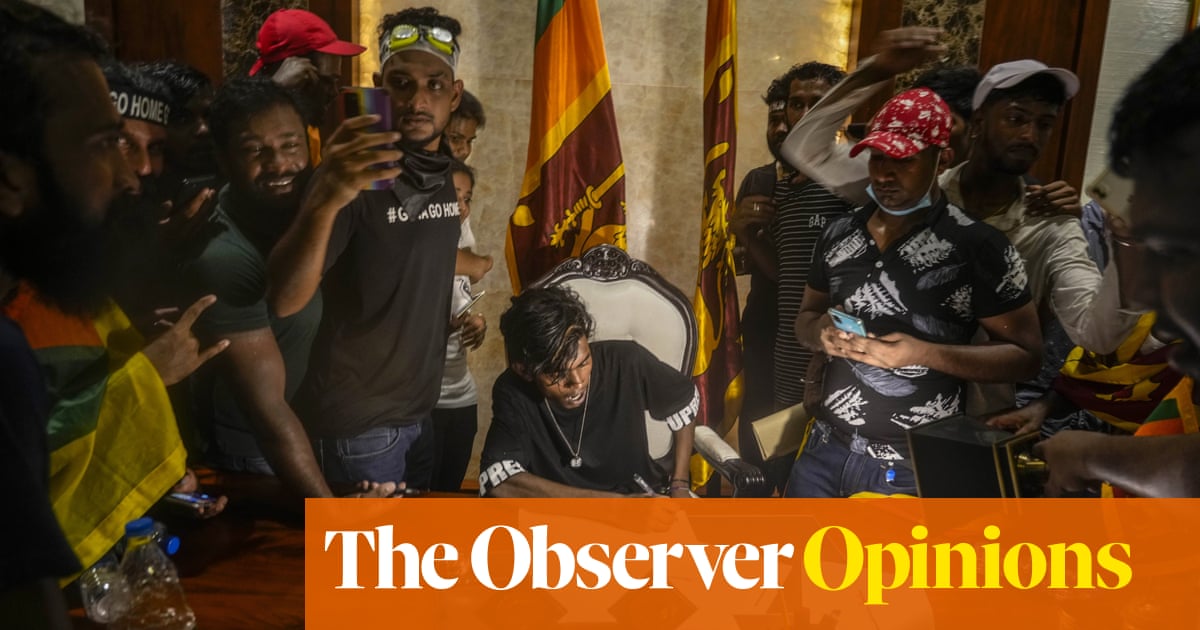
Show caption Protesters occupying the office of the prime minister Ranil Wickremesinghe after President Gotabaya Rajapaksa fled the country last week. Photograph: Rafiq Maqbool/AP Opinion The Observer view on the upheaval in Sri Lanka Observer editorial The country faces a long road to recovery, but there are hopeful signs that its democracy will survive the predatory rule of the Rajapaksas Sun 17 Jul 2022 06.30 BST Share on Facebook
Share on Twitter
Share via Email
Sri Lankans are to be congratulated on their ousting of the Rajapaksa family, crowned by last week’s hasty flight into exile of the country’s president, Gotabaya Rajapaksa. The dramatic downfall of this predatory dynastic clan, which first took power in 2005, carries salutary lessons for other democracies where a famous name and elite connections sometimes count for more than competence and integrity.
Sri Lanka is frequently described as an exceptional country, and in many ways it is. The peaceful behaviour of most of the anti-government protesters, and the fact the army did not attempt to seize power as a political vacuum developed, clearly set it apart. Yet the root causes of its recent troubles are readily recognisable the world over.
Gotabaya Rajapaksa, his brother Mahinda, who preceded him as president, and another brother, Basil, who was appointed finance minister, consolidated their power over a pyre of dead bodies – the thousands of mostly Tamil victims of the long-running civil war they brought to an atrocious conclusion in 2009. War crimes committed during that dreadful time remain unpunished.
Like unscrupulous populists and nationalists everywhere, the Rajapaksas exploited divisions stemming from economic insecurity, prejudice and plain ignorance, setting the Sinhalese Buddhist majority against the mostly Hindu Tamil and Muslim minorities. Rather than heal the wounds caused by the separatist war, they played upon them. After the Easter Sunday Islamist extremist attacks in 2019, they repeated the exercise.
The brothers further cemented control by centralising power around the presidency, offering unaffordable tax cuts and running up extraordinary levels of debt. A “super-growth” spending spree on roads, airports and stadiums raised borrowing by over $14bn amid credible claims of corruption, bribery and money laundering.
More unexpected, perhaps, was the sheer incompetence of the Rajapaksas’ increasingly autocratic rule, especially following Gotabaya’s presidential victory in 2019. Their piling up of new loans, their irresponsible printing of paper money and their ill-advised interest rate cuts collided with the onset of the pandemic, a global downturn and an ensuing collapse in tourism and remittances sent from abroad.
Beijing’s irresponsible foot-dragging echoes the experience of other countries in the global south
Brutality, cupidity, stupidity, iniquity: the too common failings of abusive political leaders around the world, and the Rajapaksas had them all. Sri Lanka was heading for economic meltdown. By early 2022, the country owed $51bn in foreign debt and was running out of dollars. In May, it defaulted. Fuel, basic foodstuffs and medicines grew desperately scarce. Hence the uprising on the streets.
Like other countries that have undergone similar, wrenching upheavals, the pressing question now is whether Sri Lanka can find a better way forward. It will need help, not least from a reluctant China, whose $5bn in no-strings, high-interest loans to the Rajapaksa regime fuelled its profligacy. Other big creditors, including India and Japan, will have to accept a haircut, too. Meanwhile, an IMF bailout is sought.
Janet Yellen, US Treasury secretary, rightly called on China last week to fulfil its obligation under the G20’s “common framework” to help restructure Sri Lankan debt. Beijing’s irresponsible foot-dragging echoes the experience of other countries in the global south, such as Zambia, Chad and Ethiopia. They too have been caught up in Beijing’s self-serving “debt-trap diplomacy”.
Sri Lanka faces a long road back and, once the dust settles, political backsliding poses an obvious risk. A new president will be chosen by parliament this week. There is talk of a unity government and constitutional reform. The fact the protests brought together all the ethnic and religious groups is a hopeful sign. For now at least, and against the odds, Sri Lanka’s democracy has survived a long and testing ordeal.








